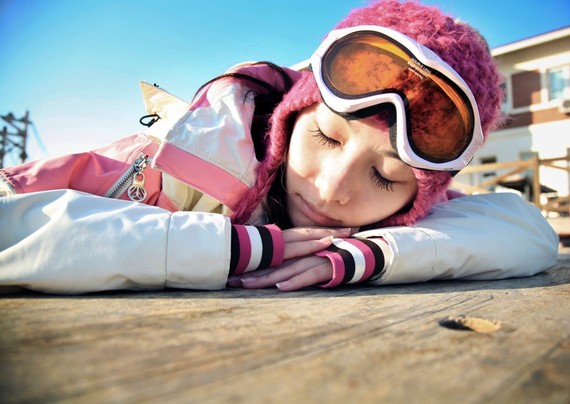Winter can be a cruel time for many. With so many holidays, it's one of the busiest and most enjoyable times of the year, but the cold weather and long nights can lead to all kinds of mental and physical health issues. That's why it's important to pay extra attention to your health over winter -- after all, you wouldn't want anything spoiling the fun.
Outside of the obvious tips like wrapping up warm and wearing sensible shoes, there are some lesser known winter health hacks that can really make the difference.
Though it's easy to oversleep in winter, it isn't recommended. Image by Only Sequel.
Try Not to Oversleep
With so little daylight it can be tempting to snuggle down and hibernate like a bear. With most of us leading pretty hectic lives, it seems logical that more sleep could only be good for you, but this is actually far from the truth.
Research conducted by the University of Birmingham found that those who sleep for more than eight hours a day are 15 percent more likely to develop metabolic syndrome than people who sleep less.
What is metabolic syndrome, you ask? It's a combination of diabetes, obesity and high blood pressure that severely raises your risk of heart disease and stroke. The study found that between seven and eight hours a day was the optimum time, and any more could actually be detrimental to your health.
Simulate the Dawn
Some people suffer from lack of sunlight so much that they develop a condition called Seasonal Affective Disorder -- or SAD -- named because essentially the main symptom is you get very sad.
One cause of this disorder is lack of sunlight in the mornings. Usually, when we register the sun rising in the mornings, our brain secretes cortisol which helps wake us up and makes us feel ready to face the day. In winter this doesn't happen, leading to sluggish and depressed mornings.
Luckily you can buy light therapy alarm clocks that simulate the sun at dawn. These work by gradually brightening from a dull red glow, to a bright white light over a period of around 30 minutes. Our eyes detect the light changing and begin the process of waking up naturally, rather than being jolted awake into near darkness by an alarm.
Seek the Sunshine
After the festive frolics of the holiday season there's this terribly depressing time that people call January. And at the very darkest point of this dark, dark month -- a day called "Blue Monday."
Falling on the third Monday of the month, poor weather, little daylight and mounting debt combine to create a perfect storm of awfulness, making Blue Monday the most depressing day of the year.
Although there's not much we can do about the weather, there is a way to combat the long nights. When we're starved of sunlight, our bodies start to lack Vitamin D, which we use to make the feel-good hormone serotonin.
It only takes a little bit of UVB light to trigger the production of Vitamin D we need. Try to go outside as much as possible, even if the weather is poor. To add a little extra boost, try eating more Vitamin D-rich foods like eggs, fatty fish and orange juice.
Watch Your Stance
Winter brings with it a load of manual tasks that we might not be used to doing, such as shoveling snow, fetching Christmas decorations from the attic, or sledging with the kids. Combined with the cold weather, this makes winter particularly bad for accidental injuries.
You'd think as adults we'd have gotten the hang of simple things such as sitting, standing and lifting -- but apparently not. Stats show that 650,000 lasting musculoskeletal injuries are suffered each year as a result of incorrectly lifting, pushing and pulling -- and that's just in the workplace.
When putting your body under any kind of force or pressure make sure that you try to use your larger muscle groups, rather than what feels most convenient. The classic example would be to use your legs to straighten yourself when lifting something off the ground, rather than your back or arms.
Fight Flab With Food
It's hard to avoid overindulgence over the holidays. There's too much temptation for most right minded people to bear. Inevitably, when January comes along, we're looking to undo some of the damage done to our waistlines.
An obvious place to start when trying to lose weight is to eat less, but completely starving yourself over short periods is not sustainable in the long run. Instead, eating small amounts of the right things more frequently is the best way to go.
That's because the hardest thing about dieting is the overpowering hunger pangs from restricting food intake. You can quell these by eating small and healthy snacks throughout the day, which will keep you feeling full. Choose protein-rich foods with plenty of fiber such as nuts, seeds and some fruits. For example, almond butter on half a banana is a healthy and delicious afternoon snack that can keep you going 'til dinner.
